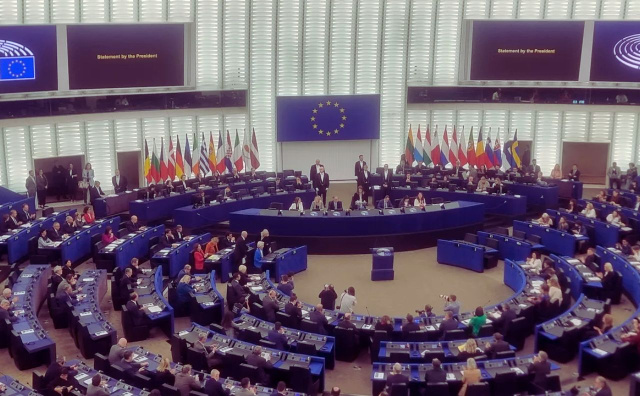The European Parliament witnessed a tense and highly charged debate over the state of the rule of law in Bulgaria following the arrest of Varna Mayor Blagomir Kotsev. The discussion turned into a sharp confrontation between political groups, with “Renew Europe” (RE) and the Bulgarian opposition party “We Continue the Change” (WCC) coming under fire from multiple sides. Members of the ruling coalition in Bulgaria: GERB and BSP, and even from the opposition – the pro-Russian “Revival” party – united in criticism, accusing the liberals of exaggerating long-standing issues in Bulgaria for political purposes.
The debate, initially delayed by over 40 minutes due to votes on other resolutions, proceeded with only around 35-40 MEPs remaining, according to Iliya Lazarov from GERB and the European People’s Party (EPP). Valérie Hayer, chairwoman of RE, called Kotsev “one of the political prisoners in the EU,” emphasizing that he was elected to promote reforms, transparency, and anti-corruption measures. She described his detention in a high-security cell without a fair trial as “a shame for a free and democratic EU” and a reflection of oligarchic influence in Bulgaria. Hayer urged the European Commission to send an urgent fact-finding mission to Bulgaria and suggested withholding EU funds until the country demonstrates respect for rule-of-law standards. She added, “If justice can be distorted for one person, no one is safe. If we remain silent, we are complicit in the crime.”
Further reading: Renew Europe Launches Mission to Probe Rule of Law Concerns in Bulgaria
Bulgarian socialists also weighed in. Kristian Vigenin from the Progressive Alliance of Socialists and Democrats argued that RE was “hysterically exaggerating” Bulgaria’s problems, which had persisted for years due to political instability and chaotic reforms. Vigenin highlighted that no party in Bulgaria is innocent, noting past abuses by WCC and others, including the arrest of opposition leaders by former Prime Minister Kiril Petkov. He emphasized that the debate should not be manipulated as a tool for foreign interference, stating, “There are no innocents. What is happening is a result of joint actions between ruling and opposition parties in Sofia.”
WCC members defended Kotsev’s detention as politically motivated because he “chose integrity.” Nikola Minchev (WCC/RE) criticized the European Commission’s report for underestimating the gravity of the situation in Bulgaria and stressed that EU funds should be linked to the protection of rule-of-law principles. He said, “The mayor of Varna was given an ultimatum: to choose another party or be arrested. He chose integrity and was arrested.” Ilhan Kyuchyuk echoed concerns over the legality of actions against Kotsev and other opposition figures, pointing to broader issues regarding institutional independence.
Critics from “Revival” and far-right groups in the EP accused WCC of undermining citizens’ referendum rights and collaborating with ruling parties to violate the constitution. Petar Volgin referred to the party’s own political missteps, stating, “You yourself prepared the noose with which you hoped to strangle your political opponents. However, they turned out to be more cunning than you. You are the embodiment of the proverb ‘the cunning magpie with two legs.’” Independent MEP Elena Yoncheva cautioned against interference in Bulgaria’s judiciary, arguing that attempts to attack Kotsev compromise judicial independence and threaten state stability.
Other speakers emphasized systemic concerns over political control of institutions. Radan Kanev (DSB/EPP) warned that Bulgaria’s state apparatus, special services, and Prosecutor’s Office were not serving public policy but attempting to seize economic and media power, drawing parallels to abuses under communist-era State Security. Socialist MEP Tsvetelina Penkova countered that Bulgaria is now stable, democratic, and committed to the rule of law, citing judicial reforms, restoration of institutional dialogue, and progress toward Eurozone membership.
Hristo Petrov (WCC/RE), known as Itso Hazarta, highlighted the symbolic dimension of Kotsev’s arrest: “Today is the present for us, but one day it will be written in history: Blagomir Kotsev was free, and 7 million were in custody.” European liberal leaders including Valérie Hayer, Svenja Hahn, and Sophie Wilmès stressed the need to safeguard democracy in Bulgaria and protect EU values.
The Council of the EU reaffirmed that rule of law and democracy are fundamental principles, noting that Bulgaria’s situation would be discussed during the General Affairs Council on November 17. The European Commission acknowledged some recent reforms, such as judicial oversight of prosecutor decisions, legislation on mediation cases, lobbying regulations, and whistleblower protections. Yet, the EC also expressed ongoing concerns regarding media freedom, financing, and transparency, warning that progress has been uneven and that political influence over institutions remains a pressing issue.
We remind you that Blagomir Kotsev, the mayor of Varna, was arrested on July 8, 2025, on charges of embezzlement and participation in an organized crime group. Supporters of Kotsev have argued that the charges are politically motivated, aimed at weakening opposition leadership. His arrest sparked protests across Bulgaria and in several European cities, with demonstrators denouncing selective justice and the use of anti-corruption institutions as political instruments. The European Parliament’s liberal group, Renew Europe, has called for measures to protect the rule of law in Bulgaria and even suggested suspending EU funds until the situation is clarified.
Despite the controversies and political tensions, the Sofia Appellate Court upheld Kotsev’s detention, citing concerns that he could influence the ongoing investigation. The case has attracted widespread attention and raised broader questions about corruption, political interference, and the independence of institutions in Bulgaria.
